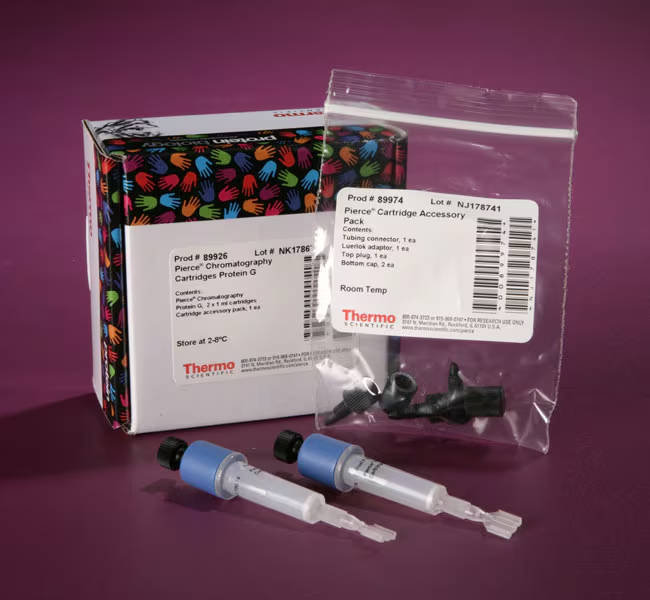
The Thermo Scientific™ Pierce™ Chromatography Cartridges Protein G are convenient, ready-to-use prepacked devices for isolation and purification of mammalian polyclonal and monoclonal antibodies from serum, ascites and cell culture supernatants.
Pierce Protein G Agarose consists of recombinant Protein G that has been covalently immobilized onto high-quality crosslinked 6% beaded agarose (CL-6B). This particular variety of the affinity resin provides the most versatile combination of chromatographic features for high yield and high purity purification of whole IgG from mammalian serum samples. The agarose beads have physical and chemical properties suitable for many affinity purification systems.
Features of Pierce Protein G Agarose:
• Protein G – immobilized Protein G is ideal for polyclonal IgG purification from mouse, human, cow, goat and sheep serum, including human IgG3 and mouse IgG1 isotypes
• Agarose resin – support is crosslinked 6% beaded agarose (CL-6B), the most popular resin for protein affinity purification methods
• Inert and stable – superior manufacturing method immobilizes Protein G by charge-free, leach-resistant covalent bonds, resulting in low nonspecific binding and enabling multiple uses without decline in yield
• Standard capacity – Pierce Protein G Agarose has a normal load of immobilized Protein G, providing a binding capacity of 11 to 15 mg human IgG/mL resin
Pierce Chromatography Cartridges are compatible with the major automated liquid-chromatography systems or for manual syringe processing, and attach directly to ÄKTA™ or FPLC Systems without additional connectors. An accessory pack, included with each product, readily adapts columns for use with Luer-Lok Syringe Fittings or 1/16” tubing. The Protein G cartridges provide fast, easy and reproducible chromatographic separations and can be regenerated for multiple uses.
Protein G is a bacterial cell wall protein original from group G Streptococcus and now produced as a recombinant in E. coli. Like Protein A, Protein G binds to most mammalian immunoglobulins primarily through their Fc regions. Native Protein G contains two immunoglobulin binding sites, as well as albumin and cell surface binding sites. In the recombinant form of Protein G, these albumin and cell surface binding sites have been eliminated to reduce nonspecific binding when purifying immunoglobulins. Recombinant Protein G has a mass of approximately 21.6kDa, but its apparent size by SDS-PAGE is 31 to 34kDa. IgG-binding function is optimal at pH 5 but also occurs efficiently in near-neutral conditions (pH 7.0 to 7.2).
Compared to Protein A, Protein G binds a broader spectrum of IgG subclasses from human, mouse and rat serum. In particular, besides binding other isotypes just as well as Protein A, Protein G exhibits stronger binding to human IgG3, mouse IgG1 and all three isotypes of Rat IgG. Thus, Protein G is generally recommended for applications involving these species and isotypes of antibody. With regard to other species, Protein G provides higher-capacity binding for IgG from cow, goat and sheep, but it binds more weakly than Protein A to pig, guinea pig, dog and cat IgG.
Pierce Protein G Agarose is prepared using Thermo Scientific AminoLink Coupling Chemistry, which provides several advantages compared to traditional methods of ligand immobilization. AminoLink Immobilization results in conjugation between sugar monomers of the agarose beads and native lysine residues on the Protein A via simple amide bonds. Unlike typical cyanogen bromide (CNBr) immobilization, the AminoLink Method does not introduce any novel chemical groups that could cause undesired nonspecific binding and produces a stable, essentially irreversible bond. The result is a high-binding-capacity resin that retains functional immobilized Protein
| Code | Description |
|---|---|
| 89926 | Catalog Number: 89926 |
| 89927 | Catalog Number: 89927 |

